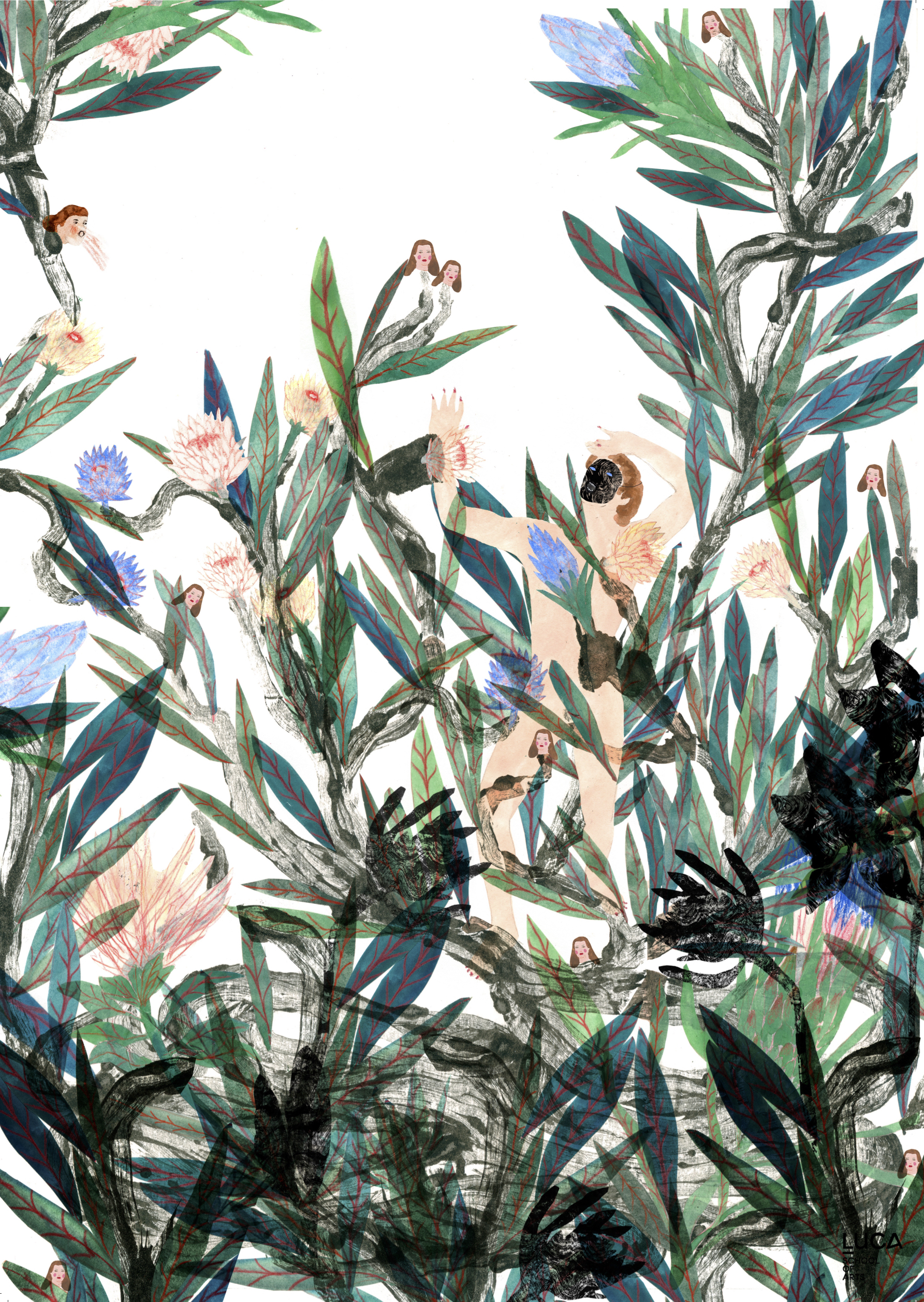
Urban Academy 2019
- workshop
- discussions
Two days of discussions and workshops around the imaginaries of ecology - Art and Activism in Times of Climate Change
Urban Academy 2019
Imaginaries of Ecology
Art and Activism in Times of Climate Change
In response to more than six months of student mobilisation in the streets of Brussels and elsewhere, Cifas is taking up the ecological issue to bring the debate and confront the strategies and tools of art with the challenges of social struggles.
During two days, between conferences, discussions and practical workshops, we will try to understand and experiment with different modalities of artistic activity directly related to climate mobilisations.
Ecology is not just about carbon levels or rising sea levels, and mobilisation is not just a matter of thoughtful collective awareness. It is also a major project to invent an imaginary world to find ways of mutual aid and cooperation among living beings.
Scientific data have long been available and freely accessible, actions to be undertaken are known, listed and widely documented. Nevertheless, we resist the change that seems too difficult to reach for our tiny lives, as if our imaginations had difficulties to imagine another possible world, more responsible, more attentive to our human nature.
If modern narratives seem to implode with the Anthropocene, if the announcement of the approaching end of the world colours our struggles with bitterness, how to tell other stories, how to invent joyful struggles, social solidarity relationships, utopias in action?
With Clémence Hallé (FR), Barbara Glowczewski (FR), Nidala Barker (AU), John Jordan and Isabelle Frémeaux (FR), Maria Lucia Cruz Correia & Steven Desanghere / Urban Action Clinic (BE), Bud Blumenthal / Extinction Rebellion (BE), Leandro Brasilio & Priscilla Toscano / Desvio Colectivo (BR), Gosie Vervloessem (BE)...
Programme
Tuesday 24.09
9h00: Breakfast
9h30: Performance
The Horror Garden - Gosie Vervloessem
(in English)
10:15 > 12:30: Seminar
Imaginaries of Ecology - Barbara Glowczewski (FR), Nidala Barker (AU), Clémence Hallé (FR), Bud Blumenthal / Extinction Rebellion (BE), facilitated by Aysegul Sert (TR)
(in French)
12:30 > 13:30: Lunch
cooked by Les Cocottes volantes
14:00 > 16:00: Workshop
Led by Maria Lucia Correia Cruz (BE)
(in English, facilitation French / Portuguese)
16:30 > 18:30: Workshop
Led by Leandro Brasilio & Priscilla Toscano / Desvio Coletivo (BR)
(in English, facilitation French / Portuguese)
20:30: Conference : A Short Guide to Creative Resistance.
By John Jordan and Isabelle Fremeaux / Laboratory of Insurrectionary Imagination (FR)
During this conference, Isabelle Fremeaux and John Jordan, co-founders of L.I.I., will explore various principles guiding their practice, illustrated by a myriad of examples from their own work as well as that of international accomplices.
(in French)
Wednesday 25.09
10:00 > 18:00: Workshop
Laboratory of Insurrectionary Imagination
(in French)
Subscriptions
All our activities are free of charge (lunch and breakfast included), but it is necessary to suscbribe in advance and separetly for both days.
-> Tuesday 24.09: Subscriptions here *
-> Wednesday 25.09: Subscriptions here (before 15 September)
* Some sessions can only host a limited number of participants, thank you for detailing which sessions you want to subscribe for in the "Comments" box. As a reminder, here are the different options:
- Breakfast
- Performance The Horror Garden
- Seminar Imaginaries of Ecology
- Lunch (only available for people who follow morning and afternoon sessions)
- Workshop led by Maria Lucia Cruz Correia & Steven Desanghere / Urban Action Clinic (BE)
- Workshop led by Leandro Brasilio & Priscilla Toscano / Desvio Coletivo (BR)
- Conference by the Laboratory of Insurrectionnal imagination
Interventions and workshops
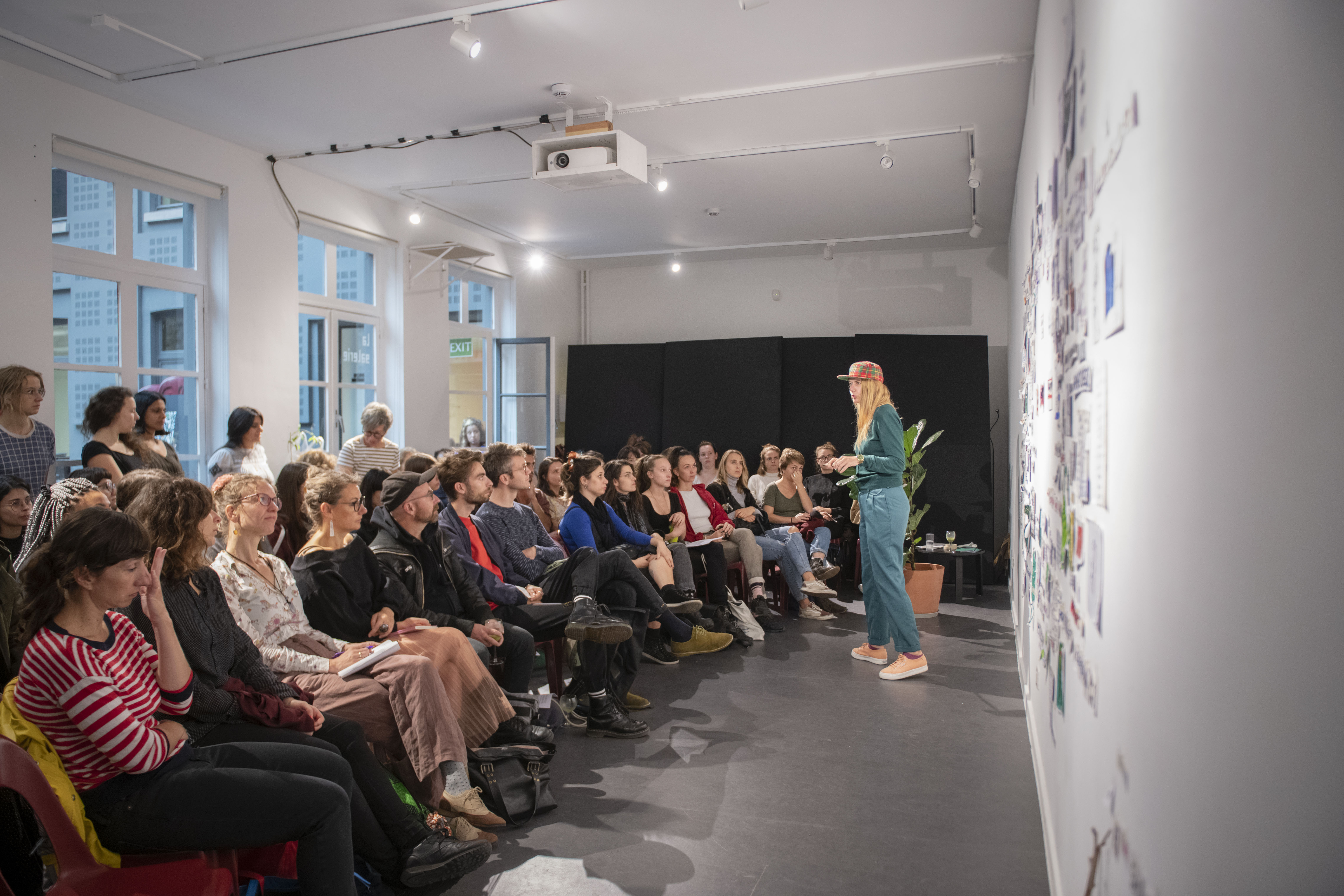
The Horror Garden is an investigative performance and/or installation about the relationship between humans and plants, which questions a number of important issues. Do people treat plants with enough respect? Do plants feel recognized and understood by people? Can the relationship between people and plants transcend the unlimited mutual exploitation? What can we learn about ourselves if we consider plants as the significant order and what kind of horror can this lead to? What happens when plants break out of the background of our living rooms?
When searching for an answer to these questions, Vervloessem calls on a number of horror movies in which plants frighten us. Sometimes they attack us head-on, but often the horror lies in waving branches and rustling bushes. Colonisation runs like a red thread through the story: colonisation of territory by humans and plants, colonisation of organisms, bodies and spirits…
Concept and performance: Gosie Vervloessem - Dramaturgy: Einat Tuchman - Production: wpZimmer - With the support of: CC Strombeek and de School van Gaasbeek
Indigenous Imaginaries and Transnational Alliances to Sing and Paint with the Land
By Barbara Glowczewski and Nidala Barker
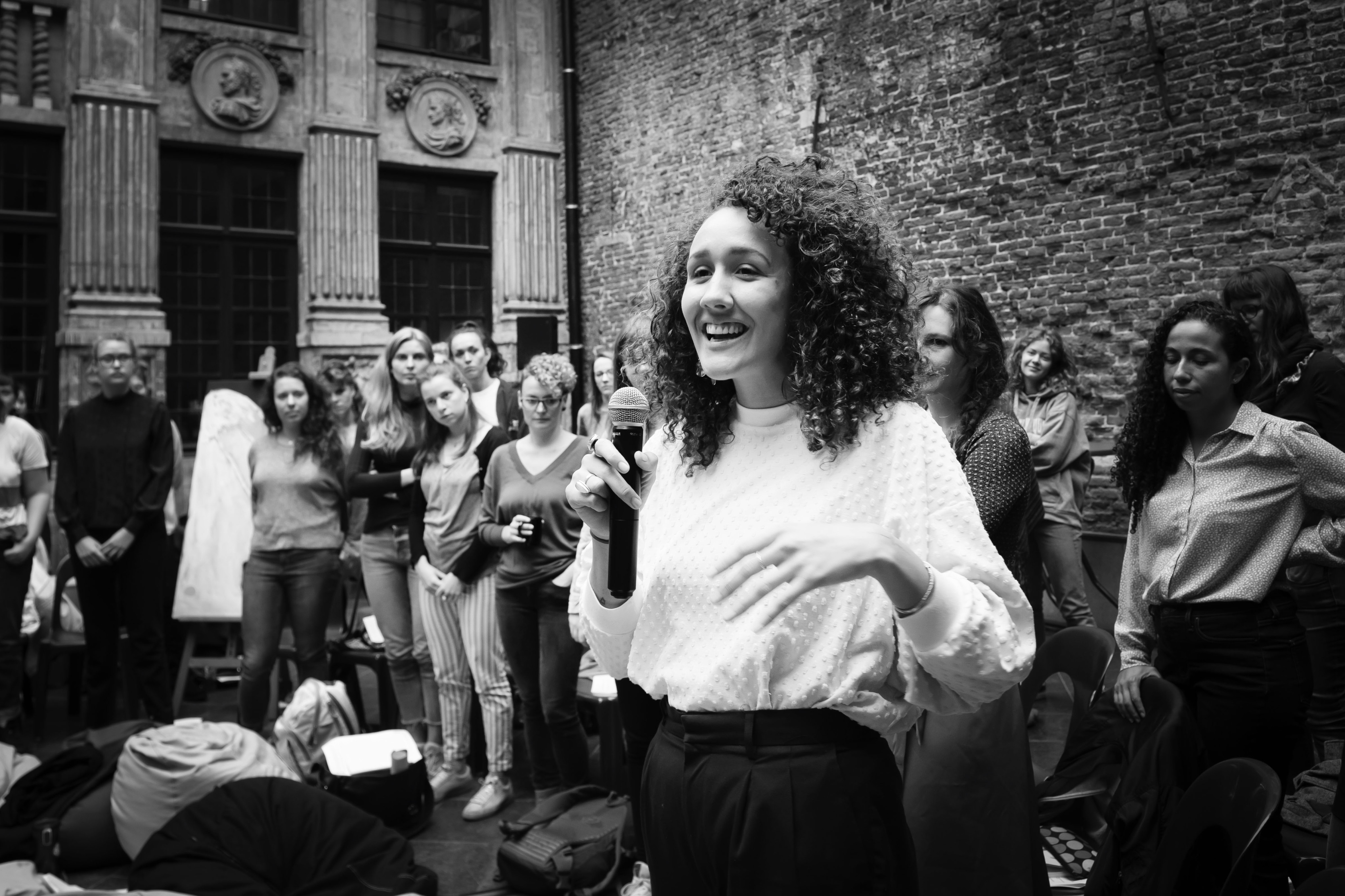
Facing major projects that destroy the environment as well as long-term occupations and mobilisations, we must find new ways to defend the common: negotiating with the State against global pressure of private economic interests, and investing the imagination to respond to ecological, social and religious conflicts, but also to violence, whether from the police, the mafias or anyone else. In Australia, the Aboriginal became involved in painting to defend their land claims in the 1980s: their works, based on the travel maps of totemic ancestors attached to the land, revolutionised the contemporary art market and served as evidence in the courts for the restitution of certain lands. Today, the younger generation uses music to assert its ties to the land and mobilise against shale gas, coal or nuclear waste. In French Guiana, young Amerindians also draw on their Wayana, Kali'na or other heritage and create, through music, forms of resistance against clandestine or industrial gold panning, which is already destroying the Amazon forest and polluting their rivers. The impact of these destructions, which fatally affects populations, also concerns the future of the entire planet.
Barbara Glowczewski will discuss in dialogue with Nidala Barker who will do some vocal work to solicit the participants to update their connection to the land on which we walk and from which we all nourish ourselves both physically and spiritually.
Matters/Materials : Stories and Policies of Anthropocene
By Clémence Hallé
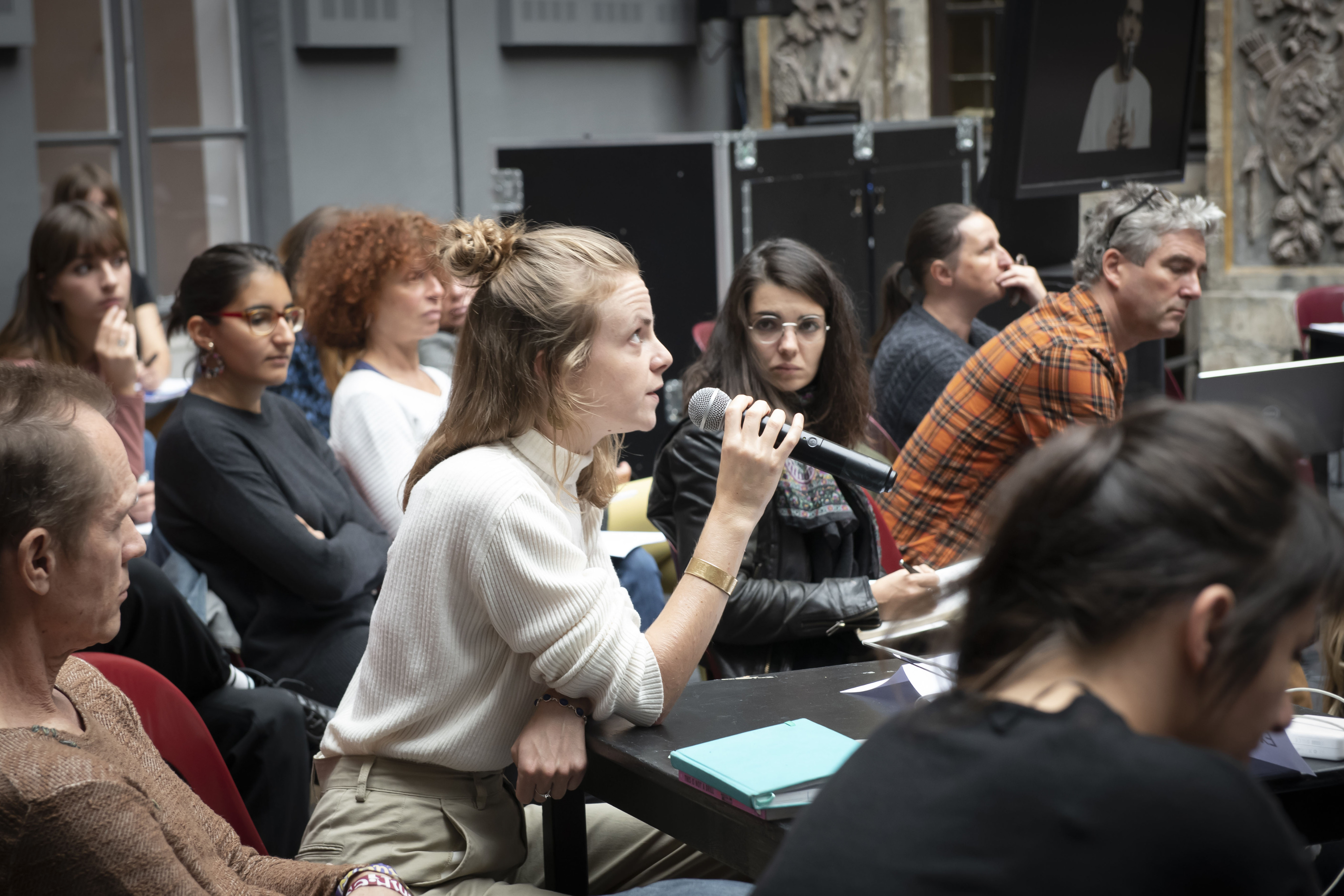
During her presentation, Clémence Hallé will discuss her research-creation method within the contemporary ecological imaginary. She will take as an example the writing of the play Matters, which tackles the emergence of the Anthropocene hypothesis (literally meaning the "geological age of the human being") in the world of the human sciences and the arts. Matters is a solo, a polyphonic assemblage that shapes the archives of the inaugural meeting of the Working Group on the Anthropocene that took place at the House of World Cultures in October 2014 in Berlin during the Anthropocene Project, the first platform for multidisciplinary and curatorial research on the geological hypothesis. The project has initiated a whole network of scientists, humanists and artists, trying to answer the question: what is the Anthropocene? And how to implement it?
Bud Blumenthal (BE) / Extinction Rebellion
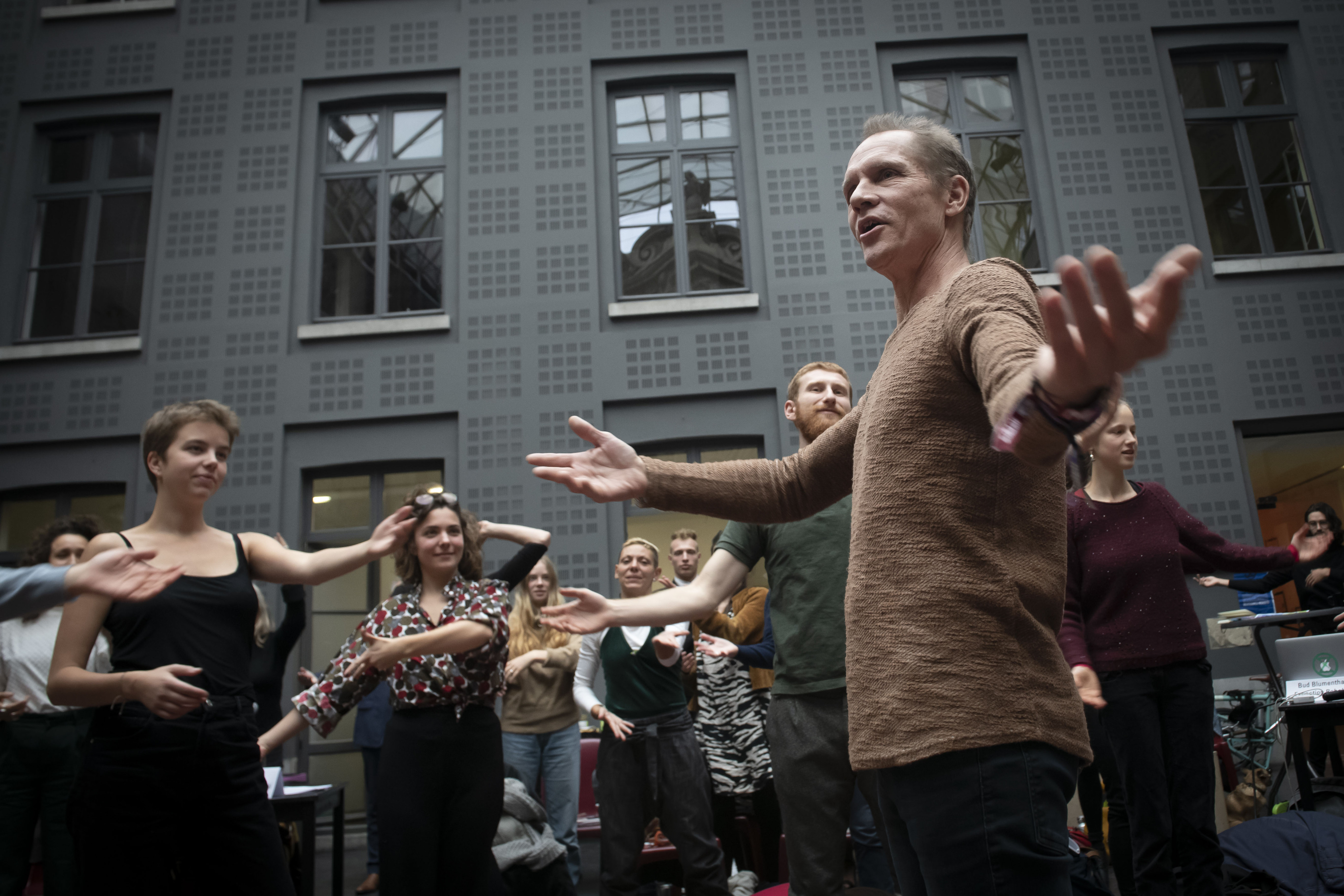
Extinction Rebellion (XR) is an international movement using non-violent direct action to persuade governments to act on the Climate and Ecological Emergency.
On 31st October 2018, Extinction Rebellion UK announced a Declaration of Rebellion against the UK government. 94 academics supporting this declaration signed a first open letter to the Guardian saying: “When a government wilfully abrogates its responsibility to protect its citizens from harm and to secure the future for generations to come, it has failed in its most essential duty of stewardship. The ‘social contract’ has been broken, and it is therefore not only our right, but our moral duty to bypass the government’s inaction and flagrant dereliction of duty, and to rebel to defend life itself.” A second open letter soon followed on December 9th of the same year. These letters did not only resonate in the UK. Within a few weeks XR had spread to lots of other countries, and in January 2019 XR Belgium was formed.
Extinction Rebellion is now active in over 60 countries, with over 350 local groups working relentlessly to build this global movement.
Workshop: Urban Action Clinic
By Maria Lucia Cruz Correia and Steven Desanghere / Urban Action Clinic
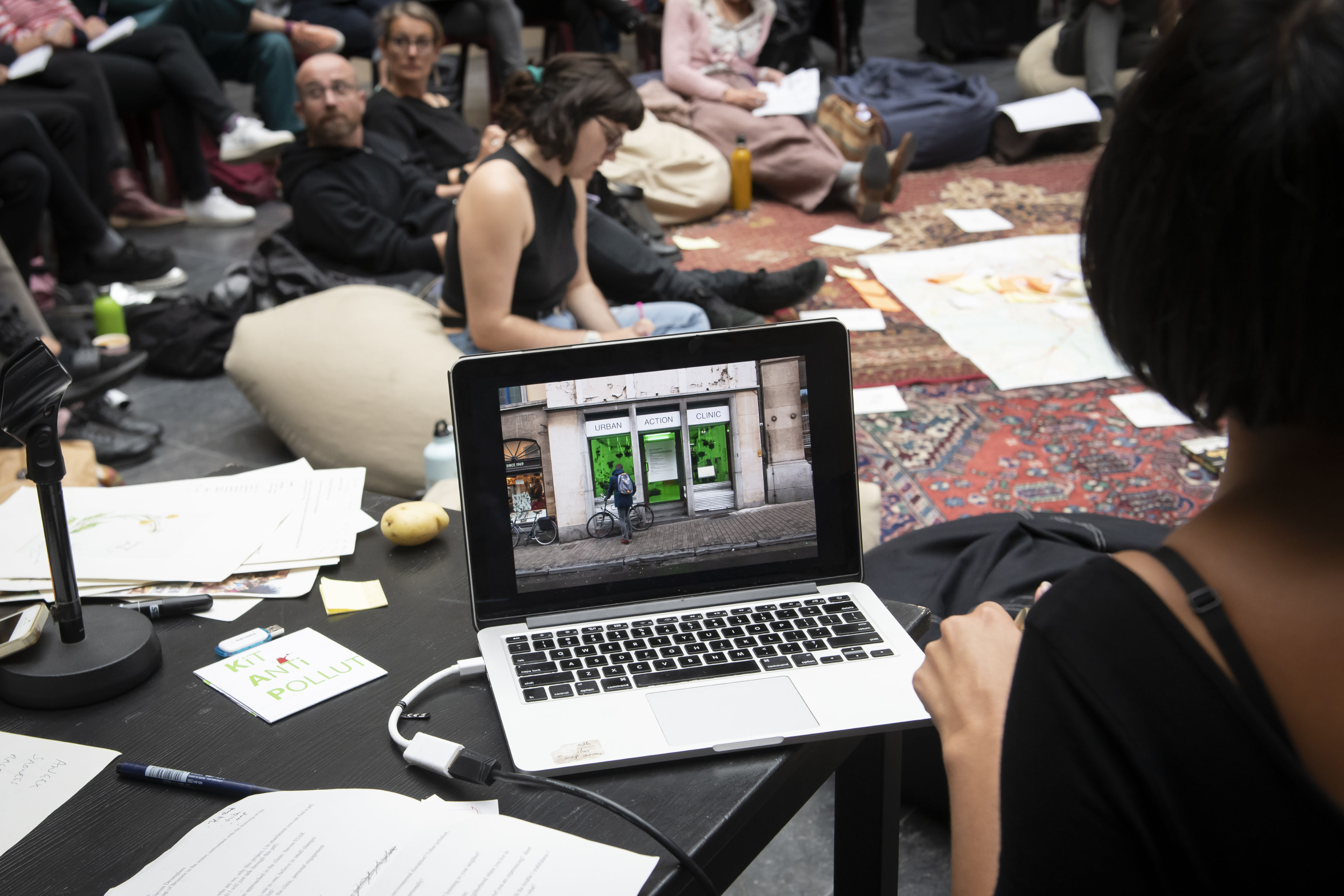
U.A.C Urban Action Clinic is a temporary collective laboratory focusing on environmental tactics to counteract pollution in urban spaces. It is also a multidisciplinary body of work uniting science, art and activism to raise awareness on the impact of environmental crimes and climate change.
In 2015, Maria Lucia Cruz Correia, Pr. Roeland Samson, Nathalie Hunter and Steven Desanghere proposed a utopian prototype for a public service that cities could offer to their residents. The service would bring clarity and information on ecological disorders in the city and at the same time bring solutions to eliminate toxic chemicals and heavy metals from industry and car pollution.
The project started in 2015 in close collaboration with Pr. Samson’s scientific team at the University of Antwerp. The research focused on the use of the magnetic method (SIRM) to monitor the level of pollution in plants, allowing a precise visualisation of the amount of ferromagnetic particles (PM) deposited on the leaves.
Together with Nathalie Hunter, an anti-pollution kit was designed to give an insight on phytoremediation techniques and local plants which are remediating the soil and human body from pollution.
During the workshop, Maria Lucia and Steven Desanghere will invite the participants to explore their personal environmental disorders in specific neighbourhoods. Together, the group will develop environmental tactics focused on creative activist tools, legal advice and restorative methodologies adapted to the cases of each participant.
Workshop: Brazilian Activist Urban Performance
With Priscilla Toscano and Leandro Brasilio
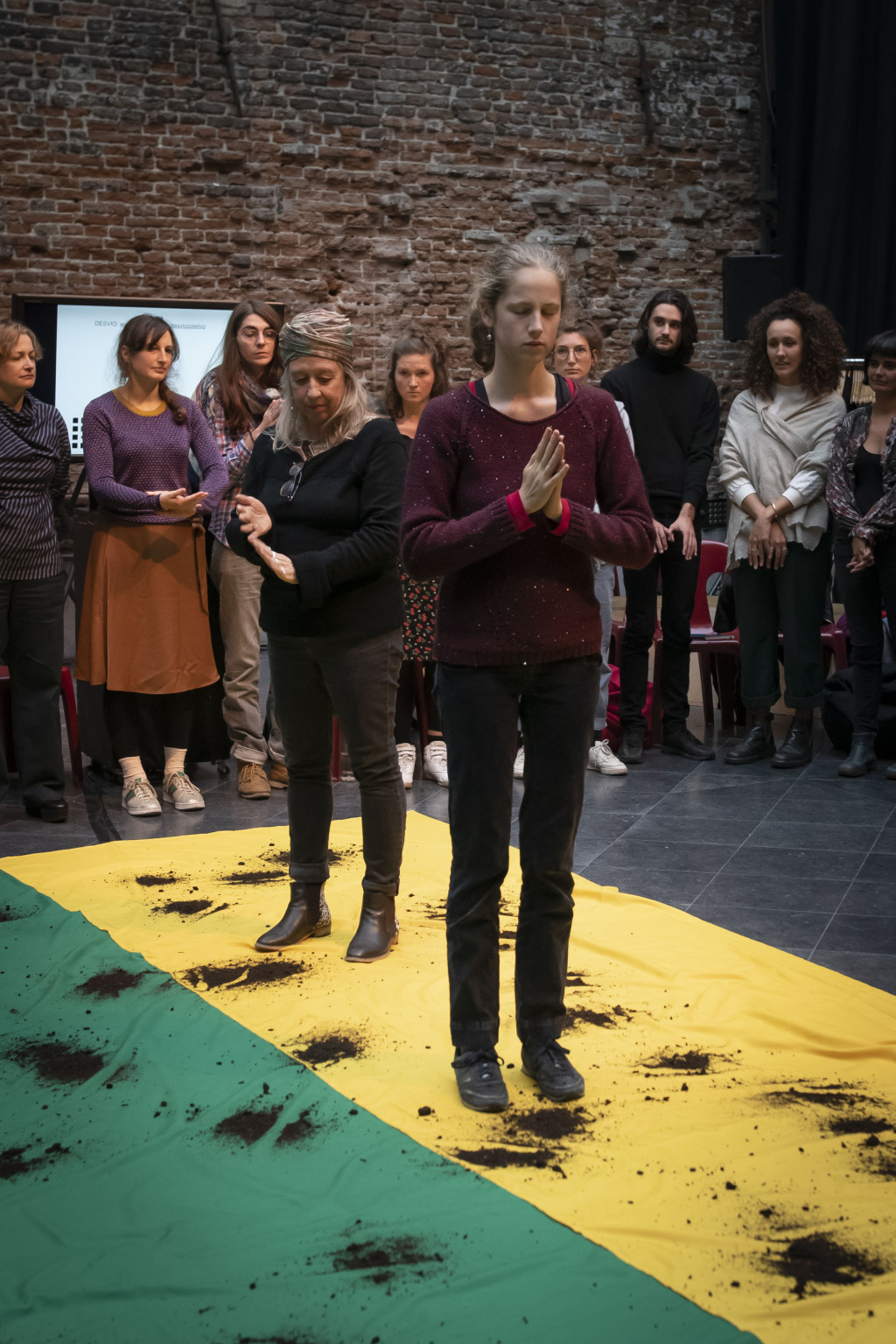
During this workshop, Priscilla Toscano and Leandro Brasilio will show some works of their repertoire, as well as a brief overview of the main artists and collectives that are dedicated to the field of activist / urban performance in Brazil.
They offer a reflection about this form of artistic expression, which is necessarily linked to issues of social struggles. There will also be a discussion around the recent news and serious issue of the Brazilian Amazon rainforest. From there, the participants will experiment the artistic language of activist urban performance combined with this urgent theme that concerns the entire international community, followed by a simple performative exercise on the street.
Speakers
Barbara Glowczewski (FR), is Research Director at the Social Anthropology Laboratory (CNRS/EHESS/Collège de France). She works on reticular thinking and resistance strategies of different groups of Aboriginal people in Australia as well as on transnational alliances with other indigenous peoples and collectives fighting against injustice and ecocide. Author of numerous books (including La Cité des Cataphiles, Desert Dreamers, Rêves en colère, Guerriers pour la Paix, and Indigenising Anthropology with Guattari and Deleuze, EUPnd) and audiovisual productions, including the film Lajamanu which restores her 40 years of research with the Warlpiri. She is engaged with the Advisory Committee of the Common Land Endowment Fund / Fonds de dotation de Terre en Commun.
Nidala Barker (AU), born on the land of her paternal grandmother Djugun (Broome, Western Australia), uses different tools from her indigenous heritage to promote the bonds that exist within each of us to better connect with our environment. As an environmental activist and musician, her work invests the intersection between activism and the need to create links with each other to connect with the environment, while exploring the sorority of womanhood. She is 25 years old and works in a regenerative farm where she guides groups of children and adults to talk and sing about care and connection to the land. For her master's degree (USYD), she carried out research on food autonomy and solidarity in a farm in Sydney. She intervened at the Embassy of Indigenous Peoples at COP21 in Paris, at the Food and Nutrition Security Forum at the University of Sydney, and most recently during the Extinction Rebellion rally in Brisbane to encourage positivity and solutions when one often feels hopeless.
Clémence Hallé (FR) is preparing a PhD in the laboratory of "Sciences, Arts, Creation and Research" of the Ecole Normale Supérieure in Paris on the stories of the Anthropocene. In her thesis, she continues her work on the recomposition of contemporary ecological thinking that she began under the supervision of Professor Bruno Latour, first in political philosophy, then by taking a commission from her Political Arts Experimentation Program at Sciences Po (SPEAP) as a field of study. In this context, she wrote the report of an early simulation of COP21 at the Théâtre Nanterre-Amandiers, Paris Climat 2015: Make it Work, in the form of a script, with illustrator Anne-Sophie Milon (Halle et Milon 2015). The method that Anne-Sophie and Clémence first experimented with when writing and drawing this play inspired the research-creation projects that they are now developing based on their respective research.
Born in Chicago, Bud Blumenthal (BE) has been dancing and making works in Europe since 1988 first with Frédéric Flamand, then with Michèle Noiret before starting his own company Hybrid in 2002. His work often features innovative new technology-based scenery. He invents mechanical and electronic devices to bring unusual perceptions to the audiences.
In 2009, he launches DANCERS! an installation and web library honoring dancers with a vast collection of precisely-filmed 2-minute solos by professional dancers of all styles and techniques
Cutting-edge technologies developed for his previous immersive and interactive piece, Perfectiøn, serve the techno/ecological group work Leaves of Grass. In January 2019 he joins the international ecologist movement Extinction Rebellion.
The artistic work of Maria Lucia Cruz Correia (PT/BE) shows her deep engagement for environmental crises and climate change. She reacts to the ecological crimes of our times by bringing audiences into a participatory environment that connects the artistic with the voices of scientists, activists and lawyers. Her actions tackle human disturbances by proposing clinical aesthetics that unveil human and non-human interconnectivity. Correia's work is informed by contemporary discourses on the Anthropocene, colonisation and the commodification of Nature, while proposing participatory articulations as temporary and autonomous platforms. Most of her projects are engaging tools, creating moments of disruption and harmony between seemingly disparate bodies of knowledge, resilience, value systems and restoration.
Since 2013, Correia is part of the artist program stadresidenten in Vooruit and her work is being supported by the Imagine 2020 network.
Steven Desanghere (BE), born 1972, is a long time activist, youth worker and group facilitator. He has worked many years around topics such as sustainable agriculture, human rights, peace, diversity and true democracy. As a trainer he has developed workshops around conflict transformation, group dynamics, welcoming diversity, resistance to learning, politicisation of struggles, etc. In his work he gets a lot of inspiration from Civil Disobedience, Critical Pedagogy, Deep Democracy, Deep Ecology, and he is currently diving into the power of Gestalt Therapy.
Priscilla Toscano and Leandro Brasilio (BR) are members of Desvio Coletivo, a network of creators that work at the border zone between urban interventions and performance art. Through the creation of artistic interventions in different urban spaces, the group develops actions that generate islands of ephemeral disorder of critical and poetic nature.
Priscilla is the group's artistic director, performer, art educator and researcher in urban performative intervention, who graduated from the University of São Paulo with a master's research entitled Political Performance in Public Spaces – A Guide for Empowered Women.
Leandro is an artist, producer and lawyer who researches the limits of art in public space, specialist in Cultural Project Management from the University of São Paulo.
John Jordan is an activist artist, "a kind of magician of the rebellion" according to Libération and an "extremist from the inside" according to the British police. He was co-director of Platform, a social art group from 1987 to 1995, before working with the direct action collective Reclaim The Streets (1995-2000). In 2003, he co-edited the book We Are Everywhere: The Irresistible Rise Of Global Anti-Capitalism published by Verso. He was professor of Fine Arts for almost ten years (1994-2003), and then left university to work on Naomi Klein's film The Take. In 2004, he had the ridiculous idea of founding the Clandestine Insurgent Rebel Clown Army, which he deserted a few years later.
Isabelle Fremeaux grew up in France before going to London, where she worked as a freelance journalist, French teacher and administrator of a community arts company, while completing a PhD on the concept of Community. She became a lecturer in Media and Cultural Studies at Birkbeck College-University of London (GB) where she practised for 10 years, before leaving University to breathe the wind of freedom and experiment the collective. Thanks to L.I.I, she has been successively (and sometimes simultaneously) a rebel clown, a pirate, a disobedient cyclist, a utopian... She pursues her action-research that explores popular education and collective dynamics, and lends her skills to various collectives, associations and institutions as a trainer and consultant.
John and Isabelle are the co-authors of the film/book Les Sentiers de l'Utopie (La Découverte, 2011) and now live on the zad of Notre-Dame-des-Landes.
As a performance artist, Gosie Vervloessem (BE) experiments with the laws of physics for domestic use. Her work focuses on observing natural phenomena and asking questions about it. Everything seems so logic, but what is the logic behind it? In 2014 the focus of Vervloessem’s work shifted to eating, digestion and indigestion. It resulted in lecture performances, open labs and an online magazine about slow processes, invisible friends and foes, about hygiene and control in the kitchen. How to relate to an unclassifiable world that is chaotic, unhygienic and messy? Vervloessem has been pushing the idea of the kitchen as a sanctuary and a playground for uninvited guests even further. Her research invites invasive alien species in a domestic setting. What are the values that underpin invasion ecologies, and how can they be applied or denied in baking an apple pie? Currently her research dives deeper in the relation between the vegetal kingdom and Homo Sapiens, through the genre of horror. With her work, she investigates the underlying ideas of our perceptions of nature.
Aysegul Sert is a journalist. Born and raised in Turkey, she worked for a long time for the American press in New York and Los Angeles as a correspondent. Her reports have led her to meet people from both the political and cultural spheres such as J.M.G. Le Clézio, Sebastião Salgado, Shirin Neshat, Yasmina Reza, Isabel Allende, Julian Schnabel, Laurent Gaudé and Maya Angelou. Currently, she shares her life between Istanbul and Paris. She collaborates with the New York Times and The New Yorker, among others. In addition, she regularly contributes to Arte and France 24 on international news.